おすすめの製品
アッセイ
≥97% (HPLC)
形状
powder
色
white to beige
溶解性
DMSO: 2 mg/mL, clear
保管温度
−20°C
SMILES記法
C1(NC2=CC(C3CC3)=NN2)=CC=NC(NC4=CC=C(N=CN5)C5=C4)=N1
InChI
1S/C17H16N8/c1-2-10(1)13-8-16(25-24-13)22-15-5-6-18-17(23-15)21-11-3-4-12-14(7-11)20-9-19-12/h3-10H,1-2H2,(H,19,20)(H3,18,21,22,23,24,25)
InChI Key
WJNBSTLIALIIEW-UHFFFAOYSA-N
詳細
APY29 is considered as a type I kinase inhibitor of inositol requiring kinase enzyme 1 α (IRE1α).
生物化学的/生理学的作用
APY29 has the ability to enhance inositol requiring kinase enzyme 1 α (IRE1α) (P830L)′s oligomeric state to rescue RNase activity.
APY29 is a small molecule that inhibits the kinase activity of IRE1α (in vitro autophosphorylation IC50 = 280 nM) by targeting its active site ATP-binding pocket, while simultaneously acting as an allosteric activator of IRE1α RNase activity (EC50 = 460 nM) by keeping the active site in an open conformation. When applied 1 hr prior to stress induction by 4-hr 6 nM thapsigargin treatment, APY29 significantly potentiates stress-induced unfolded protein response (UPR) in rat insulinoma INS-1 cultures (XBP1 mRNA processing induction = 54% without vs. 78% with 1-hr 3 μM APY29 pretreatment).
保管分類コード
11 - Combustible Solids
WGK
WGK 3
引火点(°F)
Not applicable
引火点(℃)
Not applicable
適用法令
試験研究用途を考慮した関連法令を主に挙げております。化学物質以外については、一部の情報のみ提供しています。 製品を安全かつ合法的に使用することは、使用者の義務です。最新情報により修正される場合があります。WEBの反映には時間を要することがあるため、適宜SDSをご参照ください。
Jan Code
SML2381-BULK:
SML2381-5MG:
SML2381-VAR:
SML2381-25MG:
試験成績書(COA)
製品のロット番号・バッチ番号を入力して、試験成績書(COA) を検索できます。ロット番号・バッチ番号は、製品ラベルに「Lot」または「Batch」に続いて記載されています。
Airong Su et al.
Viruses, 9(9) (2017-08-24)
In response to the endoplasmic reticulum (ER) stress induced by herpes simplex virus type 1 (HSV-1) infection, host cells activate the unfolded protein response (UPR) to reduce the protein-folding burden in the ER. The regulation of UPR upon HSV-1 infection
Alexei V Korennykh et al.
BMC biology, 9, 48-48 (2011-07-07)
Ire1 is a signal transduction protein in the endoplasmic reticulum (ER) membrane that serves to adjust the protein-folding capacity of the ER according to the needs of the cell. Ire1 signals, in a transcriptional program, the unfolded protein response (UPR)
Megan M Robblee et al.
Cell reports, 14(11), 2611-2623 (2016-03-15)
Diets rich in saturated fatty acids (SFAs) produce a form of tissue inflammation driven by "metabolically activated" macrophages. We show that SFAs, when in excess, induce a unique transcriptional signature in both mouse and human macrophages that is enriched by
Likun Wang et al.
Nature chemical biology, 8(12), 982-989 (2012-10-23)
Under endoplasmic reticulum stress, unfolded protein accumulation leads to activation of the endoplasmic reticulum transmembrane kinase/endoRNase (RNase) IRE1α. IRE1α oligomerizes, autophosphorylates and initiates splicing of XBP1 mRNA, thus triggering the unfolded protein response (UPR). Here we show that IRE1α's kinase-controlled
Rajarshi Ghosh et al.
Cell, 158(3), 534-548 (2014-07-16)
Depending on endoplasmic reticulum (ER) stress levels, the ER transmembrane multidomain protein IRE1α promotes either adaptation or apoptosis. Unfolded ER proteins cause IRE1α lumenal domain homo-oligomerization, inducing trans autophosphorylation that further drives homo-oligomerization of its cytosolic kinase/endoribonuclease (RNase) domains to
ライフサイエンス、有機合成、材料科学、クロマトグラフィー、分析など、あらゆる分野の研究に経験のあるメンバーがおります。.
製品に関するお問い合わせはこちら(テクニカルサービス)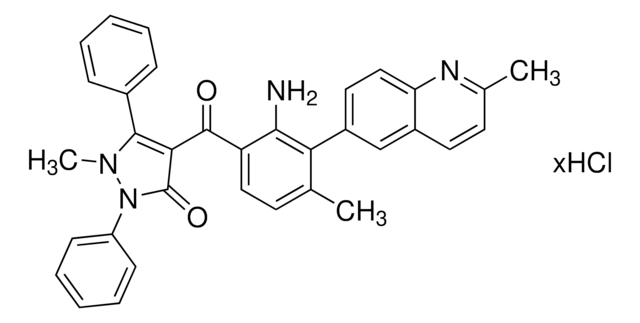
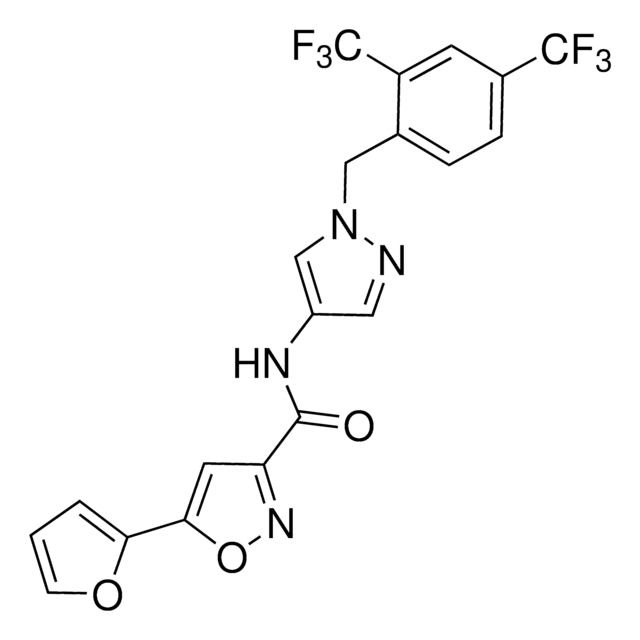

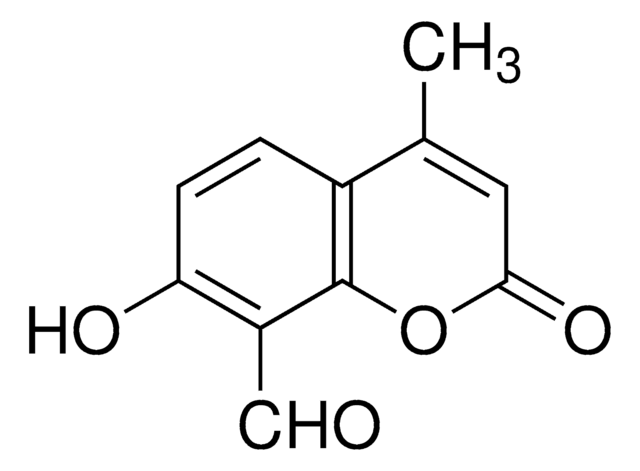
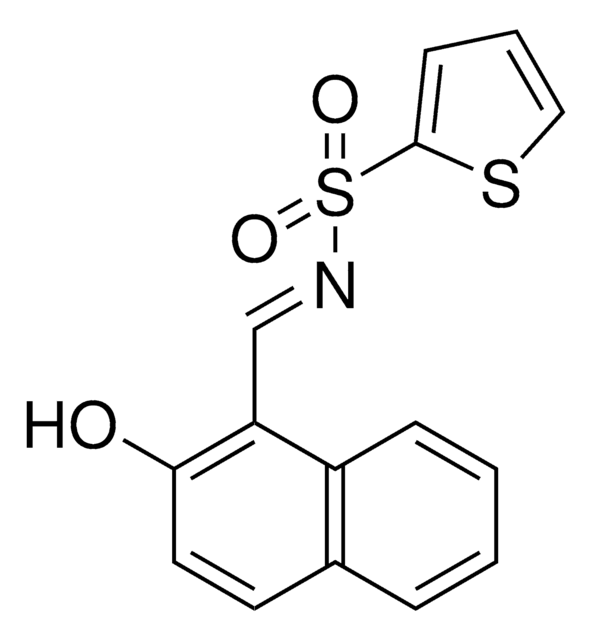
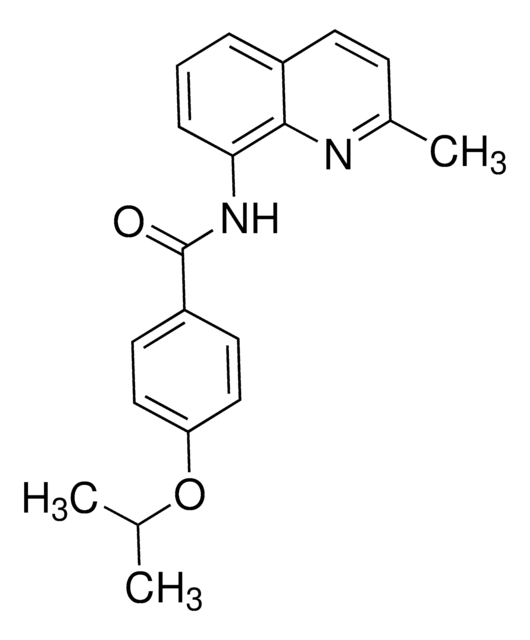

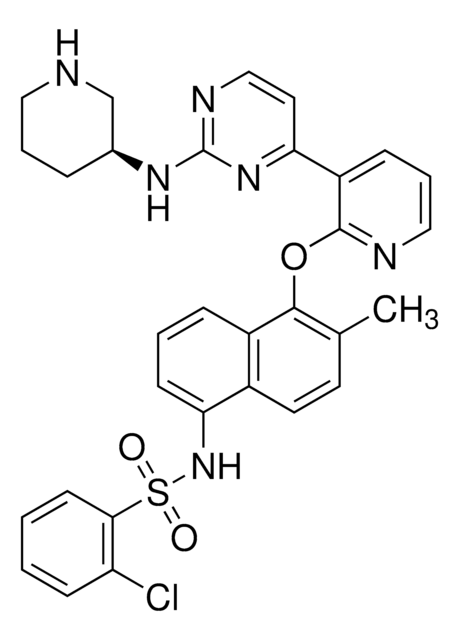
![PERK Inhibitor I, GSK2606414 GSK2606414 is a cell-permeable, highly potent inhibitor of EIF2AK3/PERK (IC₅₀ = 0.4 nM; [ATP] = 5 µM). Targets PERK in its inactive DFG conformation at the ATP-binding region.](/deepweb/assets/sigmaaldrich/product/structures/180/559/efa716dc-d5fe-4339-a6f0-0103084fc04a/640/efa716dc-d5fe-4339-a6f0-0103084fc04a.png)